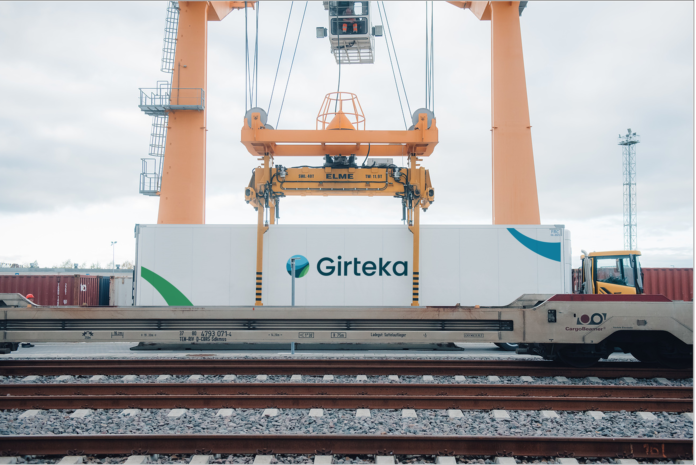Girteka, traditionally a road transport company with a fleet exceeding 6,000 trucks and 7,000 trailers, has made intermodal rail services a key part of its business strategy.
These services offer an eco-friendly and efficient alternative for long-distance full truckload (FTL) deliveries, aligning with the company’s sustainability and efficiency objectives.
Intermodal rail transport is one of the most environmentally friendly options for long-distance cargo, potentially cutting CO2 emissions by up to 90% compared to road transport.
Girteka’s commitment to this is evident: in 2022, the company reduced its CO2 emissions by over 16.7 million kilograms by covering more than 16.22 million kilometres by rail.
Girteka maintained this momentum throughout 2023, achieving similar outcomes. In 2024, the company expanded its intermodal operations, increasing the volume of goods moved via rail.
“We are constantly working to improve our intermodal rail services and to engage
customers who may have previously seen this mode of transport as unconventional
or unreliable,” stated Larisa Senkevičienė, Intermodal Business Development
Manager, at Girteka.
Girteka has established a comprehensive intermodal network across Western Europe, with a strong focus on electrified routes. This expansion has been supported through strategic partnerships with companies like Helrom, CargoBeamer, CFL, and Lorry-Rail & VIIA Rail Motorways.
These collaborations enable Girteka, one of the largest carriers, to offer services to and from key locations such as Kaldenkirchen and Düsseldorf (Germany), Nassjo/Katrineholm (Sweden), Bettembourg (Luxembourg), Vienna (Austria), Domodossola and Bari (Italy), Poznan (Poland), as well as Le Boulou and Calais (France).
The goods transported along these routes range from temperature-sensitive food products and high-value items to other specialized cargo requiring careful handling and monitoring. Through the integration of Real-Time Visibility (RTV) systems, customers can track their shipments continuously, ensuring full transparency and reliability throughout the logistics process.







